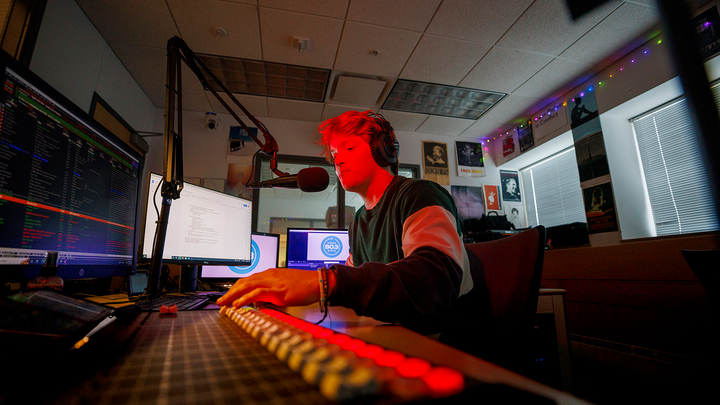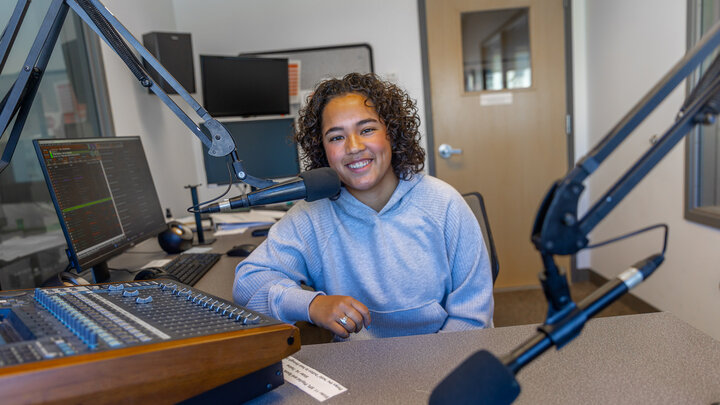Since its launch in 1970, 90.3 KRNU has been a cornerstone of student broadcasting at the University of Nebraska-Lincoln. This student-run radio station has evolved from a modest 10-watt operation to a robust platform, producing everything from sports play-by-plays to podcasts. As KRNU prepares for its next chapter, a comprehensive renovation promises to modernize the station’s equipment and infrastructure, ensuring students can continue to hone their skills with cutting-edge technology while providing high-quality programming to their audience.
KRNU’s journey began in 1924, when the University of Nebraska-Lincoln introduced its first radio course, followed by the addition of radio broadcasting to the curriculum in 1937. The post-World War II era saw the establishment of KNUS, KRNU’s predecessor, giving broadcasting students the opportunity to share their work within the campus community.
By 1970, with the backing of the Nebraska Broadcasters Association, KRNU officially hit the airwaves. Over the past five decades, the station has been a launchpad for students, many of whom have gone on to successful careers in media, journalism, and broadcasting. Today, KRNU operates at 100 watts, maintaining two webstreams and offering a diverse array of programming. Its role in shaping student broadcasters and engaging the community has solidified its historical significance at UNL.
The upcoming renovation at KRNU is not just a routine update—it’s a transformative overhaul designed to significantly enhance student learning and experience. By upgrading to industry-standard tools, KRNU will equip students with the technical skills and confidence they need to excel in the broadcasting field.
One of the key upgrades will be the replacement of the aging transmitter and monitoring systems, including the installation of a new Nautel VX150 transmitter. This will ensure more reliable operations and minimize downtime, providing students with a consistent platform to broadcast their shows, sports events, and podcasts. The introduction of redundancy in the system means that students can focus on content creation without the worry of technical disruptions, preparing them for the fast-paced nature of real-world broadcasting.
“Renovations of KRNU will really benefit the quality of student content,” Jacob Schrantz, a senior broadcasting, and sports media and communications double major, said. “I believe the work our students produce is as high quality that you could find among other students in the country and these renovations will only help our students grow even more.”
KRNU’s Technical Operations Center (TOC) will see a major upgrade with the addition of a Telos Axia Pathfinder routing system, which will give students greater control over audio feeds across the entire station. This capability will allow students to manage complex, large-scale productions, such as live election night coverage or multi-location sports broadcasts, mirroring the responsibilities they would handle in professional media environments. The new system will also streamline operations, making it easier for students to broadcast seamlessly across KRNU’s platforms.
In the realm of remote broadcasting, the replacement of outdated equipment with Tieline ViA hybrids will enable students to cover live events with enhanced audio quality and greater flexibility. Whether reporting from Memorial Stadium or covering breaking news, students will be able to operate the equipment remotely, allowing them to focus on storytelling and on-the-ground reporting. The new system will also provide students with the ability to adapt to any technical scenario, a crucial skill in modern broadcasting.
Perhaps the most impactful element of the renovation is the overhaul of the station’s audio booths and studios. State-of-the-art mixing consoles, microphones, and audio processing tools will provide students with the hands-on experience of working in a professional-grade environment.
“Being involved with 90.3 KRNU has helped me grow tremendously in the world of sports broadcasting and becoming comfortable in front of a mic,” Justice Rhody, a junior broadcasting, and sports media and communications double major, said. “I started out with very little experience, but being on KRNU allowed to me launch my own podcast and provided me the platform and the opportunity to find my identity in the world of sports broadcasting.”
This is an unparalleled opportunity for students to learn on the same equipment used in leading radio and television stations, giving them a competitive edge as they transition from the classroom to the industry.
“It is all about being ahead of the times,” CoJMC alum John Bishop (‘94) said. “I remember when I was at KRNU and how access to the then-new digital audio editing put me ahead of folks in the professional world who were still working analog.”
Early in Bishop’s professional career, stations were just starting to upgrade to digital and he had the opportunity to train the broadcasting-veterans at the station. Today, he’s the radio voice of the Creighton Bluejays baseball and basketball and co-hosts Unsportsmanlike Conduct at 1620 The Zone.
“Being at KRNU and the College of Journalism made everything I have done possible,” Bishop said. “The training and education, the access to great professional organizations who have relied on UNL grads and the overwhelming support of folks like Rick Alloway and others made my decision to attend UNL the most important in my career.”
With these upgrades, KRNU will offer a learning environment that closely mirrors the technology and operations of professional media outlets, better preparing students to navigate the evolving media landscape.
“This renovation is a game-changer for our students. It’s not just about updating equipment—it’s about giving them the tools and opportunities to push their creative boundaries and adapt to the demands of the industry,” said Alloway. “The ability to experiment with professional-grade technology, both in-studio and remotely, will ensure that our students leave KRNU fully prepared to tackle the ever-changing landscape of media and broadcasting.”
For more than five decades, KRNU has been instrumental in launching the careers of countless media professionals, and now, the station needs support to continue providing those opportunities for future students.
A fundraising campaign is underway, and donations will be critical to ensuring the completion of these much-needed upgrades. Contributions will directly impact the hands-on learning experience for students, giving them access to cutting-edge tools and preparing them to enter the industry with confidence. As Shari Veil, Dean of the College of Journalism and Mass Communications, puts it, “This renovation is not just about improving equipment; it’s about investing in our students and securing the future of media education at the University of Nebraska-Lincoln.”
Donors interested in supporting the KRNU renovation can learn more and give online at https://journalism.unl.edu/support-krnu-renovation/. For additional information, they can also contact Jeremy Lohrman, Director of Development, at 402-458-1177 or via email at jeremy.lohrman@nufoundation.org.




